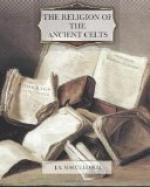The theory of the non-Celtic origin of the Druids assumes that the Celts had no priests, or that these were effaced by the Druids. The Celts had priests called gutuatri attached to certain temples, their name perhaps meaning “the speakers,” those who spoke to the gods.[1014] The functions of the Druids were much more general, according to this theory, hence M. D’Arbois supposes that, before their intrusion, the Celts had no other priests than the gutuatri.[1015] But the probability is that they were a Druidic class, ministers of local sanctuaries, and related to the Druids as the Levites were to the priests of Israel, since the Druids were a composite priesthood with a variety of functions. If the priests and servants of Belenos, described by Ausonius and called by him oedituus Beleni, were gutuatri, then the latter must have been connected with the Druids, since he says they were of Druidic stock.[1016] Lucan’s “priest of the grove” may have been a gutuatros, and the priests (sacerdotes) and other ministers (antistites) of the Boii may have been Druids properly so called and gutuatri.[1017] Another class of temple servants may have existed. Names beginning with the name of a god and ending in gnatos, “accustomed to,” “beloved of,” occur in inscriptions, and may denote persons consecrated from their youth to the service of a grove or temple. On the other hand, the names may mean no more than that those bearing them were devoted to the cult of one particular god.
Our supposition that the gutuatri were a class of Druids is supported by classical evidence, which tends to show that the Druids were a great inclusive priesthood with different classes possessing different functions—priestly, prophetic, magical, medical, legal, and poetical. Caesar attributes these to the Druids as a whole, but in other writers they are in part at least in the hands of different classes. Diodorus refers to the Celtic philosophers and theologians (Druids), diviners, and bards, as do also Strabo and Timagenes, Strabo giving the Greek form of the native name for the diviners, [Greek: ouateis], the Celtic form being probably vatis (Irish, faith).[1018] These may have been also poets, since vatis means both singer and poet; but in all three writers the bards are a fairly distinct class, who sing the deeds of famous men (so Timagenes). Druid and diviner were also closely connected, since the Druids studied nature and moral philosophy, and the diviners were also students of nature, according to Strabo and Timagenes. No sacrifice was complete without a Druid, say Diodorus and Strabo, but both speak of the diviners as concerned with sacrifice. Druids also prophesied as well as diviners, according to Cicero and Tacitus.[1019] Finally, Lucan mentions only Druids and bards.[1020] Diviners were thus probably a Druidic sub-class, standing midway between the Druids proper and the bards, and partaking of some of the functions of both. Pliny speaks of “Druids and this race of prophets and doctors,"[1021] and this suggests that some were priests, some diviners, while some practised an empiric medical science.




